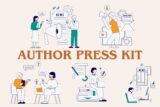Published: June 11, 2019
 Thinking about indie publishing? You’re not alone. According to Bowker’s Books in Print, more than 1 million books were self published in 2017– a 38 percent increase over the previous year. Faster and potentially more lucrative than traditional publishing, indie authors are stepping up to take control of their books.
Thinking about indie publishing? You’re not alone. According to Bowker’s Books in Print, more than 1 million books were self published in 2017– a 38 percent increase over the previous year. Faster and potentially more lucrative than traditional publishing, indie authors are stepping up to take control of their books.
Here are six driving motivators, all good reasons to join the parade of authors who have decided to become independent publishers
- You can eliminate the gatekeepers
This is a big one. Rather than spending time searching for an agent (who, if you’re lucky enough to find one, will shop your book around to publishers, who may or may not want to buy it) indie publishers are diving right in to getting their work out there. They are taking control and not waiting around for someone to approve their work for publishing. - It’s a lot faster
If you thought the process of getting your book accepted by a publisher takes a while, you’ll find the time it takes to get your book to market excruciating. Sure, indie authors still need to spend time on editing and publishing tasks, but the time from finish to printed book is greatly shortened. Once the editing process is done, it can be a matter of weeks or months, not a year or more, to have a “for sale” sign on your book. - You get a say in the design and editorial process
We all know authors who are less than thrilled with their covers, or have had their work edited to blandness. Indie authors get to drive on this front. We recommend working with a professional editor and designer, and listening carefully to their advice, but when you indie publish, no one is going to make you publish a book you don’t love. - You take the risk, but reap the rewards—no splits on the royalties, unless you want them.
With conventional publishing, your slice of the pie can be pretty thin—sometimes as little as 8 percent of the retail price. And the royalties are paid against that advance you got and already spent, so they can be a long time coming. With indie publishing, it’s possible to keep up to 100 percent of your royalties, and if you hit it big, that can be quite significant. - Retain rights to your work
If you sign with a publisher, you sign the rights to your work away. Contracts are written to include foreign rights, movie rights, and more. Imagine contracts written before the Internet age – who owns the ebook rights? What technologies might be around in the future that aren’t accounted for in your contract today? With indie publishing, you don’t need to worry – you retain the rights to everything, and control the format and distribution of your book. - You enjoy connecting with an audience and have a plan to market your book
Let’s face it: even if you publish traditionally, most of the marketing will fall on the author’s shoulders. If you’re already great at this, why not take a chance on yourself and indie publish? You’ll reap the benefits of your hard work, financially, and may even find you’re a natural.
And here is one giant reason not to indie publish:
You want to support yourself off your royalties, AND you’re allergic to the idea of marketing and sales. This combination is deadly: it can lead to a black hole through which your hard earned dollars disappear as you pay book marketers that promise to sell books, but don’t always deliver. There are some advantages to having a traditional publisher behind you, and even if the bulk of marketing falls on you, they have plenty of reliable resources to help and guide you.
As the indie publishing market grows, more and more authors are seeing it as a viable market. Do your research and consider whether it’s right for you—you might be surprised to find it’s the perfect fit.



